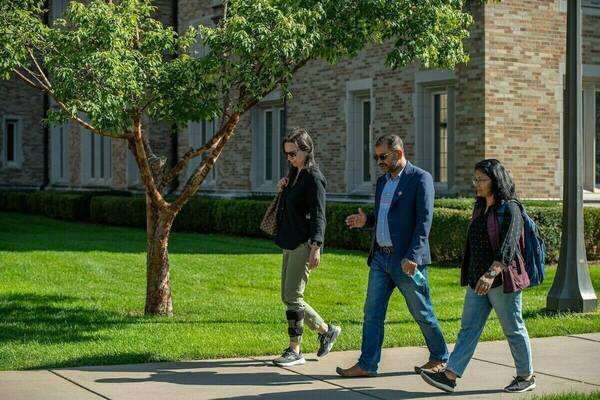Navigating the Waters of Peace: Challenges and Opportunities in the Implementation of Colombia's Peace Agreement
Nearly half the commitments outlined in Colombia's historic peace accord face significant challenges and may not happen in time unless policymakers make several key interventions, a new report from the University of Notre Dame warns.
The report offers a blueprint to salvage an accord that has lagged behind its implementation deadlines, putting its legacy at risk. It highlights timely fixes that can strengthen the agreement.
The report was produced by the Peace Accords Matrix (PAM), part of the Kroc Institute for International Peace Studies within Notre Dame's Keough School of Global Affairs. PAM is responsible for monitoring and verifying the implementation of the accord.
This is the first time a university-based research center has played such a direct role in supporting the implementation of a peace agreement, and the first time researchers have measured the implementation of a peace accord in real time.
“The peace process is moving forward, but progress is uneven and fragile in some areas,” said Josefina Echavarría Álvarez, director of PAM. “The next few years will be critical.”
The report highlights major contextual and security challenges, including the fragmentation of armed groups involved in the ongoing “Total Peace” negotiations and persistent violence in implementation-priority regions like Catatumbo, northern Cauca, and San Juan (Chocó). According to Colombia’s Ombudsman’s Office, 71 percent of municipalities remained under early warning alerts due to armed group activity.
“While we’ve seen progress in some areas, particularly related to political participation, the disparity in implementation levels underscores the need for a more holistic and integrated approach,” said Ángela María Ramírez Rincón, the executive director of the Barometer Initiative in Colombia.
Key Opportunities
In its evaluation, PAM found several key opportunities that could significantly strengthen Colombia’s peace process. One major recommendation is the creation of a high-level presidential office to coordinate peace efforts across government agencies, which would bring much-needed leadership and accountability. Strengthening local development plans to better reflect the priorities of communities, especially in areas most affected by conflict, would help ensure peace efforts are grounded in real needs.
The report also calls for more focused support for gender and ethnic inclusion, noting that targeted investments in these areas can drive meaningful change for historically marginalized groups. Increased international assistance directed at the most critical gaps can also help maintain momentum and ensure that peacebuilding efforts are sustainable and centered on the people most impacted.
While these figures point to persistent gaps, the report also acknowledges that some groundwork has been laid, and there are opportunities to build on existing efforts to close these implementation gaps. Despite limited advances, the implementation of gender and ethnic provisions continues to lag. Of the 130 gender-focused commitments, just 13 percent were completed, with 17 percent not yet started. Similarly, of the 80 commitments with an ethnic focus, 13 percent had been fulfilled and 60 percent remained in a minimal state, showing no progress in full implementation indicators for the past two years.
The report notes progress in areas such as women's economic reintegration and the work of ethnic institutions like the Special Jurisdiction for Peace and the Unit for the Search of Disappeared Persons, but also documents structural limitations in consultation processes and resource allocation.
The Kroc Institute’s analysis also includes insights into territorial implementation trends across the country’s 16 Development Programs with a Territorial Focus (PDET) subregions. Although some regional projects like “Together for the Territory” and “Territorial Pacts” show promise, security issues, bureaucratic delays, and financial gaps hinder their full execution.
“The coming year presents a critical opportunity to consolidate gains and address implementation gaps,” said Echavarría Álvarez. “Political will, sustained investment, and strengthened inter-institutional coordination will be essential to ensuring a durable peace.”
Since 2016, the Kroc Institute has monitored the agreement at the request of the signatories and continues to serve as a global reference for implementation tracking through the Peace Accords Matrix, the world’s most comprehensive database on peace accord implementation. The ninth comprehensive report analyzes the state of implementation from December 2023 to November 2024.
Additional Resources
Alongside the full Spanish report, the Kroc Institute has produced a handout, in English, highlighting key points of the report and has released all of its original data for other scholars to utilize in their work.
The Kroc Institute has released eight prior reports on the status of overall implementation, as well as four reports on implementation of gender provisions, three reports on implementation of ethnic provisions, a special report on the implementation of the Final Agreement from the perspective of victims’ rights, and a special report on the environmental challenges. Review all reports here.
Originally published by at kroc.nd.edu on June 11, 2025.
Latest Research
- Twenty-two Notre Dame students selected for 2025-26 Fulbright U.S. Student ProgramTwenty-two University of Notre Dame students have been named finalists for the 2025-26 Fulbright U.S. Student Program, with another seven singled out as alternates for the award. The finalists include 18 undergraduate students and four graduate students.
- From Notre Dame to Nepal: Notre Dame’s Research Communications Lead Builds New Collaborations with Kathmandu UniversityWith over 7,000 miles between them, the University of Notre Dame and Kathmandu University (KU) in Nepal stand a world apart, geographically. Take a closer look, though, and you will notice a few surprising similarities. Both are situated in and around sacred spaces…
- NDISC Students Study the American Revolution and Modern Navy with ROTC and Naval Academy Cadets and MidshipmenIn the second iteration of the Notre Dame-Naval Academy collaborative staff ride, students and staff participated in a two-week series of historic site visits and character presentations centered around the American Revolutionary War as well as visited modern military facilities to gain a better understanding of the various Navy communities and broader military joint capabilities.
- Yichun Wang named standing member of NIH Innovations in Nanosystems and Nanotechnology Study SectionYichun Wang, Keating-Crawford Collegiate Professor of Biomolecular Engineering and assistant professor of chemical and biomolecular engineering at the University of Notre Dame, has been appointed to serve as a standing…
- Women of African ancestry may be biologically predisposed to early onset or aggressive breast cancersResearch from the University of Notre Dame is shedding light on why Black women are likely to have early-onset or more aggressive subtypes of breast cancer. The study published in iScience found that a population of cells in breast tissues, dubbed PZP cells, send cues that prompt behavioral changes that could promote breast cancer growth.
- Doctoral student Joryán Hernández to receive inaugural Sr. Dianna Ortiz, OSU Peacemaker AwardJoryán Hernández, a peace studies and theology doctoral student at the University of Notre Dame, was tapped as the first-ever recipient of the Sr. Dianna Ortiz, OSU Peacemaker Award from Pax…













